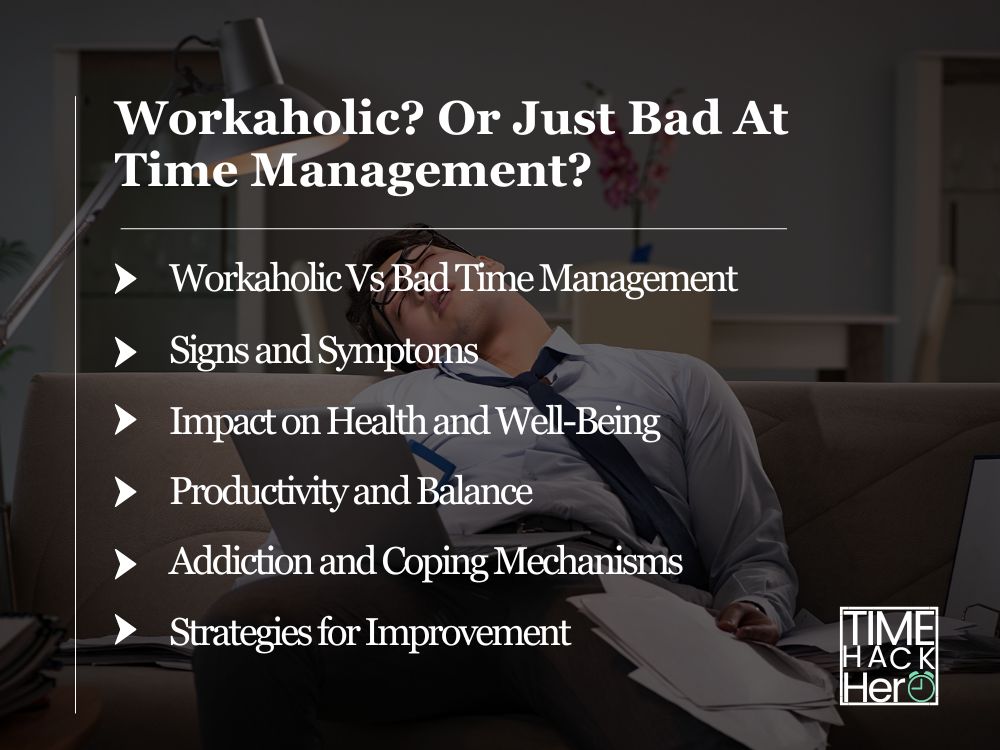In today’s fast-paced and competitive world, many professionals grapple with the conundrum of whether they are workaholics or simply bad at time management. Striking a delicate balance between career growth and personal life is essential for overall well-being, yet many find themselves struggling with an inability to disconnect from work or properly prioritize tasks.
Workaholics often take pride in their exhaustive work hours, viewing them as a testament to their dedication and commitment to success. However, it’s possible that this seemingly unwavering devotion to work is simply a byproduct of poor time management skills, leading to inefficiencies and an apparent need for long hours. By identifying the root cause, individuals can take targeted steps towards improving both their work-life balance and overall productivity.
In contrast, those who effectively manage their time may find that they achieve their goals without compromising their personal lives. By analyzing one’s work habits, developing better time management skills, and implementing positive changes, it becomes possible to maintain a healthy equilibrium between professional ambitions and personal fulfillment.
Table of Contents
Workaholic Vs Bad Time Management
Defining a Workaholic
A workaholic is an individual who has a work addiction, often prioritizing work over personal life and relationships. These individuals tend to put in long hours, even when it isn’t necessary, and have difficulties detaching from their work. Workaholics may also experience a strong sense of obligation and are driven by an internal motivation to constantly achieve. However, it is essential to differentiate between people who are genuinely engaged in their work and those who are workaholics. Engaged employees have better intrinsic motivation, communication skills, and time management skills.
Defining Bad Time Management
On the other hand, bad time management refers to the inefficient allocation of time and resources to complete tasks. People with poor time management skills often struggle to prioritize tasks, set realistic goals, and organize their schedules. This can lead to longer working hours, last-minute deadlines, and decreased productivity. In many cases, bad time management can be the root cause of workaholism.
When comparing workaholics and individuals with bad time management, it is important to consider the following factors:
- Motivation: Workaholics are driven by an internal need to constantly work, while those with poor time management skills may find themselves overwhelmed due to inefficient planning and organization.
- Health: Workaholism can contribute to higher health risks, while bad time management may simply lead to stress and decreased productivity without the same level of risk.
- Work-life balance: Workaholics struggle with detaching from work and maintaining a healthy work-life balance, whereas individuals with bad time management may be able to maintain balance once they learn better planning and organizational skills.
- Culture: It’s crucial to recognize the role of culture in both workaholism and time management. Certain cultures may encourage or discourage excessive working and work-life balance. Awareness of cultural norms can help individuals and organizations navigate these behaviors more effectively.
To sum up, distinguishing between workaholism and bad time management is essential, as each requires a different approach to maintaining a healthy work-life balance and reducing stress. By understanding the key factors that contribute to each, individuals and organizations can make informed decisions to promote a healthier working environment.
Signs and Symptoms
Workaholic Traits
Workaholics often exhibit the following behaviors:
- Long hours: Routinely working significantly beyond normal or expected hours, often at the expense of personal and family life.
- Obsession with work: Constantly thinking about work even when not present, and feeling the need to free up more time for it.
- Working on weekends: Sacrificing weekends and holidays to complete tasks or catch up on work.
- Inability to relax: Struggling to disengage or unwind from work even during leisure activities or personal time.
- High usage of emails and communication: Frequently checking and responding to emails or work-related messages, even during non-work hours.
- Bergen Work Addiction Scale: Scoring high on this scale, which evaluates work addiction symptoms, is another indicator of workaholism.
Bad Time Management Indicators
On the other hand, poor time management can manifest as:
- Procrastination: Routinely putting tasks and assignments off until the last minute.
- Impatience and frustration: Resulting from struggling to meet deadlines, feeling overwhelmed, and constantly running late.
- Poor prioritization: Difficulty in distinguishing between high-priority tasks and low-priority tasks, leading to ineffective work allocation.
- Lack of planning: Failing to create or maintain a work schedule or to-do list, creating disorganization and inefficiency.
- Inability to delegate: Attempting to handle all tasks individually rather than distributing them to others when appropriate.
While both workaholism and poor time management are detrimental to overall well-being and productivity, recognizing their signs and symptoms can help individuals take proactive steps to improve their work habits and achieve a healthier work-life balance.
Impact on Health and Well-Being
Workaholism can have significant consequences on an individual’s health and well-being. One primary concern is the stress that comes with constantly working long hours and prioritizing work over personal life. This stress can manifest in various ways, both physically and mentally, leading to a range of health problems.
Some common physical health problems associated with workaholism are:
- Sleep disturbances
- Heart disease
- High blood pressure
- Weight gain
Moreover, workaholism can also take a toll on mental health, with issues such as:
- Depression
- Anxiety
- Relationship strain
In particular, non-engaged workaholics face a higher risk, around 4.2%, of health issues than engaged workaholics, indicating that the quality of one’s working experience also plays a role in their overall well-being.
Burnout is another critical concern for individuals who are workaholics. Burnout is a state of mental, emotional, and physical exhaustion caused by excessive or prolonged stress. The constant focus on work and pushing oneself beyond limits can lead to feelings of:
- Overwhelm
- Emotional numbness
- Reduced productivity
It is essential for individuals who struggle with workaholism or poor time management to recognize these warning signs early on and take necessary steps to regain balance in their lives. Support systems, self-care practices, and setting healthy boundaries can help mitigate the adverse effects of workaholism on one’s health and well-being.
Productivity and Balance
Deep Work Vs Multi-Tasking
Deep work is the ability to focus on a particular task for an extended period without getting distracted, allowing you to achieve maximum productivity. On the other hand, multitasking involves juggling multiple tasks at once, which can result in decreased productivity and increased stress. Research suggests that focusing on deep work can greatly enhance your productivity levels and reduce distractions that hinder progress.
Here are some strategies for embracing deep work:
- Designate specific blocks of uninterrupted time for deep work
- Eliminate distractions, such as turning off notifications on your devices
- Create a dedicated workspace that promotes focus and minimizes interruptions
On the contrary, multitasking can negatively impact productivity and even reduce the quality of your work. It is essential to prioritize tasks and focus on one task at a time to optimize your time and achieve better results.
Setting Boundaries for Work-Life Balance
Establishing a work-life balance is essential for maintaining both mental wellbeing and overall productivity. When you set boundaries for your work and personal life, you help prevent burnout and ensure that you can sustain your productivity levels over a longer period.
Here are some recommendations for setting work-life boundaries:
- Stick to a defined work schedule and avoid working beyond your designated hours
- Communicate your boundaries with your coworkers or clients to manage expectations
- Take breaks throughout the day to recharge and minimize the risk of burnout
- Focus on incorporating self-care routines, such as exercise, hobbies, and quality time with loved ones
By finding a balance between productivity and maintaining a healthy work-life separation, you can minimize the impact of work-related stress and create a more sustainable approach to your professional life.
Addiction and Coping Mechanisms
Addiction can be defined as a brain disease that affects a significant number of individuals, with one out of every 12 American adults having suffered from it in 2014 according to the National Survey on Drug Use and Health (NSDUH). People may develop addictions to various substances or activities, such as drugs, alcohol, or work, and they often use these behaviors as coping mechanisms for stress, difficult emotions, or physical discomfort.
Workaholism, in particular, can be described as an addiction to work, where individuals spend excessive amounts of time and energy on their jobs. It might initially stem from a desire for achievement, a sense of pride, or an intense need for control. However, when work becomes the primary focus in a person’s life, it can cause them to experience increased busyness without an actual increase in productivity, and they may find themselves obsessively thinking about how to free up more time for work-related activities.
Coping mechanisms, on the other hand, are strategies that people employ to manage stress and emotional discomfort. For some individuals, work can serve as a positive coping mechanism that provides structure and a sense of accomplishment. However, when taken to an extreme, it may evolve into workaholism, negatively impacting an individual’s overall wellbeing.
It is essential to be aware of the potential dangers of using work as a coping mechanism, especially when it begins to interfere with personal health, relationships, and other important aspects of life. To prevent and address workaholic tendencies, consider implementing the following healthy alternatives:
- Set boundaries: Establish clear lines between work and personal life, such as specific work hours and designated areas for work-related activities.
- Practice self-care: Ensure that adequate time is allotted for personal care, relaxation, and hobbies outside of work.
- Seek support: Reach out to friends, family, or professionals who can provide guidance and encouragement to maintain a healthy work-life balance.
- Develop alternative coping strategies: Cultivate stress-reduction techniques, such as mindfulness meditation or regular exercise, that can help manage emotions without resorting to excessive work.
By understanding the addictive nature of workaholism and identifying healthier coping mechanisms, individuals can improve their time management skills and maintain a balanced life without sacrificing their sense of pride or accomplishment.
Strategies for Improvement
Prioritizing Tasks
To improve time management and avoid being a workaholic, it’s crucial to prioritize tasks effectively. Start by identifying the most essential tasks and focus on completing them before moving on to less critical ones. This can be done by:
- Creating a to-do list and ranking items based on urgency and importance
- Allocating specific time frames for completing tasks and avoiding multitasking
- Reevaluating priorities throughout the day or week, as situations change
By properly prioritizing tasks, you can create a balanced workflow, which prevents you from being overwhelmed and reduces the likelihood of becoming a workaholic.
Managing Emails
Dealing with emails is a significant part of most people’s workdays. To better manage emails and save time:
- Set designated times during the day to read, respond and organize emails
- Unsubscribe from unnecessary newsletters and notifications
- Utilize tools and strategies such as filters, folders, and labels for efficient organization
Proper email management not only helps you to be more productive but also allows you to focus on more crucial tasks.
Reducing Work Hours
Working long hours can be an indicator of poor time management. Therefore, aim to gradually reduce your work hours by:
- Setting boundaries between personal and professional time
- Taking regular breaks and using them to recharge
- Eliminating unnecessary tasks or delegating responsibilities when possible
By reducing your work hours, you promote a healthier work-life balance and improve overall productivity.
Using Time Management Tools
Time management tools can help you track, manage, and improve your productivity. One such tool is RescueTime, which provides valuable insights into how you spend your time at work. To make the best use of these tools:
- Incorporate time management software, like RescueTime, into your daily routine
- Use productivity apps or calendar tools to schedule tasks and deadlines
- Set goals, track progress, and analyze results to make necessary adjustments
Utilizing time management tools can help enhance your productivity, benefiting both your work and personal life, and ultimately boost your career.
Conclusion
In conclusion, being a workaholic and having poor time management skills are two distinct issues that can significantly impact an individual’s performance, well-being, and overall satisfaction. It is essential to identify the root cause of one’s struggles to develop appropriate strategies and find a balance between work and personal life.
For workaholics, it’s crucial to examine the reasons behind the compulsive behavior and find ways to maintain a healthier work-life balance. This can be achieved by setting boundaries, learning to delegate, and prioritizing self-care. On the other hand, individuals with poor time management skills should focus on improving their planning, organization, and goal-setting abilities to make better use of their time.
Here are some practical tips to tackle both issues:
- Set clear goals and prioritize tasks on a daily, weekly, and monthly basis.
- Break tasks into smaller, manageable parts and allocate sufficient time to complete each one.
- Utilize time management tools, such as calendars, task lists, or other digital solutions, to maintain better control of your schedule.
- Learn to say “no” when necessary, avoiding taking on too much and setting realistic expectations.
- Incorporate regular breaks and restorative activities, such as exercise, hobbies, or socializing, to prevent burnout and maintain overall well-being.
Ultimately, finding the right balance between work and personal life requires self-awareness, discipline, and constant reflection. Whether you are a workaholic or simply struggling with time management, implementing the tips mentioned above can lead to a more successful, fulfilling, and stress-free life.









